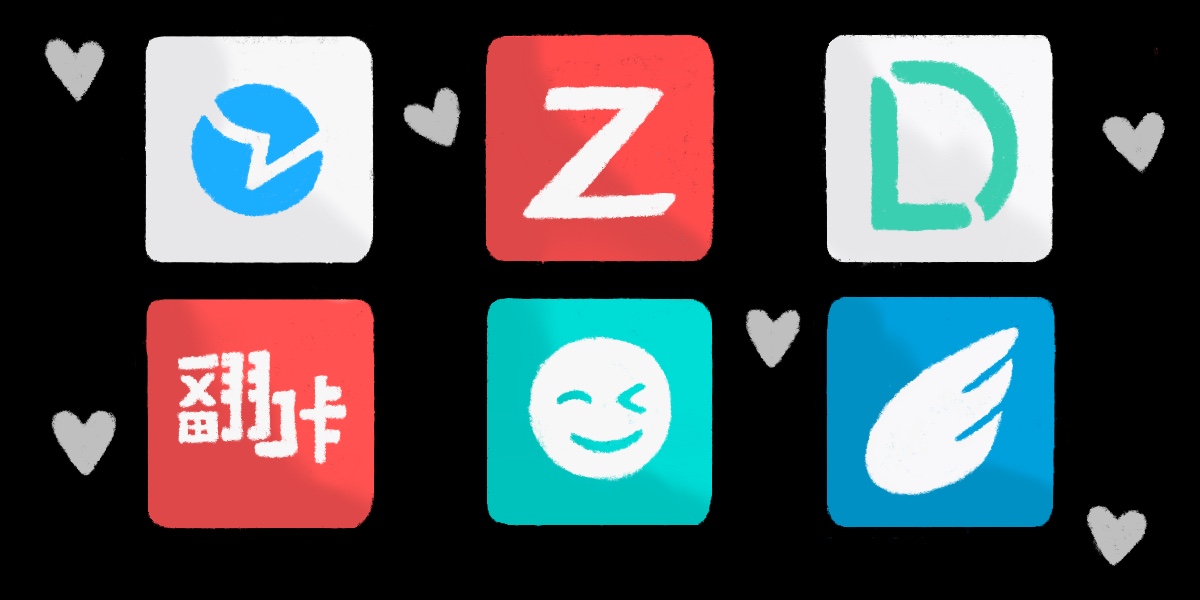Chinese LGBTQ dating apps, past and present
Gay dating apps briefly flourished in China. But many have been shut down, either for financial or political reasons. Let's have a look at some of the most influential ones.

Mobile social networking apps are vital for LGBTQ people, as they provide a much-needed space for them to find connections, relationships, love, and sex. In the early 2010s, U.S.-based app Jack’d became arguably the first popular queer dating app in China, where foreign apps are accessible with the help of VPN services that bypass the Great Firewall.
Today, the globally popular gay dating app Grindr and the all-inclusive dating app Tinder have a massive number of users in China. (In fact, Grinder was once owned by a Chinese company, Beijing Kunlun Tech, between 2016 and 2020, before it was sold under pressure from American authorities.) But their market share is only a fraction of that of local competitors. Below is a list of the major LGBTQ dating apps in China.
Blued
Originally launched in 2012, Blued is not only the largest dating app for gay men in China, but also in the world. The Grinder-like mobile social media app runs on location-based services (LBS), through which users have access to grids of profiles arranged by geographical proximity. In addition to its social networking service, Blued also operates live-streaming channels and provides professional services in sexual health and LGBTQ-related assisted reproduction.
The founder of the app, Mǎ Bǎolì 马保力, a gay man himself, previously worked as a policeman when he first started the gay social networking website danlan.org (淡蓝网 dàn lán wǎng, a name literally meaning “light blue”) in 2000, which later became the foundation for Blued. When its parent company BlueCity Holdings became the first LGBTQ-focused social media company in the world to be listed on Nasdaq in July 2020, it had over 49 million registered users and nearly six million monthly active users — 49% of which were outside of China — and was valued at $614 million.
Within a few months after its initial listing, BlueCity further enhanced its leading status in the field by acquiring another two major LGBTQ dating apps in China, Finka (翻咔 fān kā) and LESDO.
However, in the following two years, the company experienced a big loss of revenue and continuous decline of share price, which led to its delisting in August 2022. By that time, its share price had shrunk from the initial price of $16 to $1.54. As a result, Ma resigned as the chairman and CEO of the company, with the company being sold to NewBornTown, a Beijing-headquartered mobile internet company targeting global markets.
Finka (翻咔 fān kā)
Finka, now the second-largest dating app for gay men in China, originally came out in 2014 under the name Aloha. It became Finka in mid-2020. This Tinder-like app revolves around the swipe. Users are fed profiles based on algorithms, and all they need to do is to swipe right to show interest or swipe left to reject.
Finka used to be considered Blued’s major rival in the Chinese market, before its operating company was bought by BlueCity in November 2020 for 240 million yuan ($33.4 million), arguably the largest acquisition in China’s “pink economy.” Finka continued to operate as a separate app after the acquisition.
On BlueCity’s official website, Finka is introduced as “targeting Gen Z” — a more specific, younger age range compared to Blued’s larger user group.
“Most of the profiles I saw on Finda looked young, well-educated, who love posting photos and selfies of travels and workout,” Tāo 涛, a 31-year-old gay man who recently immigrated to Canada, told The China Project. “For me, they are delivering a middle-class image. In comparison, I felt people on Blued are more diverse in terms of their social and economic background.”
LESDO
LESDO, formerly known as LeDo (乐DO), was launched in 2013 by a group of queer women and developed into one of the top lesbian social apps in China before its termination in 2021. A 2019 news report by Tech in Asia shows that the company had accepted multiple rounds of investment, including angel funding from GST Ventures in 2015, then a pre-series A round from IVP, SOSVentures, and Linear in the next year. In 2019, it had 1.5 million registered users and about 225,000 daily active users.
In addition to operating the mobile app, the company also produced lesbian-themed mini movies and series. Miss You Always (夏雪薇安 xià xuě wēi ān), a 35-minute mini-movie produced by LESDO, was watched 394,000 times on Chinese video streaming site iQiyi. In the aforementioned Tech in Asia article, LESDO’s marketing director explains that through these products, the company could both directly profit from viewers’ payments and also indirectly attract potential users for the app.
LESDO was acquired by BlueCity in August, 2020, a few months before Finka, after which the app added a few new features, including a “catch” mechanism through which users could answer a personalized ice-breaking question before “catching” the attention of the person they were interested in.
The operator announced the termination of LESDO in October 2021, citing “business realignment” as the reason. According to tech news outlet Protocol, BlueCity issued an official response in which it said “the company will tighten its focus on the steady growth of its core business.”
The Protocol article also links LESDO’s termination to the challenges faced by lesbian dating apps in China, where queer women — compared to gay men — are less interested in finding hookups on sex-oriented apps and more interested in seeking committed relationships and connections, a need that can be fulfilled outside lesbian-only platforms, such as in LGBTQ groups on social media site Douban.
The L
The L was originally launched in 2012, the same year as Blued. Its was later renamed Rèlā 热拉. According to a Chinese media report, Rela received about 1 million yuan ($139,170) from an angel investor in 2014, a seven-figure USD investment in a pre-A round in early 2015 from Albatross Venture and ABC Capital, and another eight-figure financing in RMB in a series A round led by Boquan Capital and Albatross Venture in 2016. In the same year, the Shanghai-based company also received a 400,000 yuan grant ($55,000) from the local government specifically to develop a live-streaming platform for lesbian women.
In a 2016 interview, Sammy Wu, the co-founder of Rela, revealed that Rela had 4.5 million registered users, among whom 1.2 million were active every month and 30,000 were active every day.
Similar to its major rival LESDO, Rela has also produced lesbian-focused films and series, including a 18-minute mini movie called X-Love (爱的未知数 àidewèizhīshù), which has been watched 3 million times, and a sitcom called The L Bang (热拉帮 rèlābāng).
Rela has been removed from Chinese app stores at least twice. The first time was in 2017, when the unexplained disappearance of the app along with the shutdown of its Weibo account and website led to speculation about a government clampdown. The second time was in August 2020, when the app went offline for seven months without explanation. After the app returned the following January, its name was changed back to “The L.”
Fēizàn 飞赞 and ZANK (赞客 zàn kè)
Feizan was primarily a Facebook-style website. When it first came out in 2010, the mobile revolution led by the iPhone and Android system had barely started, and smartphone apps for LGBTQ people were scarce. John Wei, a media studies scholar in the University of Otago in New Zealand, remarked in his book Queer Chinese Cultures and Mobilities that Feizan intended to create an online gay community based on common “interests” rather than erotic content that was rampant on other gay sites in the same period. This prospect is reflected in Feizan’s slogan — “No erotic content; browse Feizan in your office” — which is still on its homepage today. The site’s registered users was only 10,000 in the first year, but rocketed to 800,000 in the third year.
This focus on interests continued in ZANK, a location-based gay dating app created by the same team in 2013. In a 2015 interview, the founder of both products, Líng Juédǐng 凌绝顶, said that ZANK was meant to be more than a dating site or a hook-up app; as a platform, it encourages users to find shared interests and finally meet in person. Unlike commercial-free Feizan, the mobile app ZANK received investment from venture capital and quickly became one of the top gay apps in China. ZANK also produced gay mini-series: the most popular was a sitcom called A Guest House Praise (一屋赞客 yīwūzànkè), which tells the story of a group of gay people living in the same apartment.
ZANK was suddenly shut down and removed from app stores in April 2017, when it was blacklisted by the Cyberspace Administration of China, the central regulator of internet products in the country. It was accused of allowing pornographic content on its platform. This incident happened just one month before the temporary removal of Rela. However, the closure for ZANK was permanent.
Queer China is our fortnightly round-up of news and stories related to China’s sexual and gender minority population.





